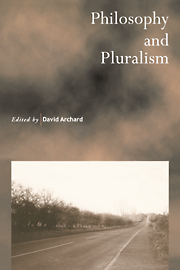Book contents
- Frontmatter
- Contents
- Notes on Contributors
- Introduction
- Philosophy in Different Cultural Contexts
- A Case for Philosophical Pluralism: The Problem of Intentionality
- William James, ‘A Certain Blindness’ and an Uncertain Pluralism
- Cultural Realism: the ancient philosophical background
- Religion and Pluralism
- A Single True Morality? The Challenge of Relativism
- Pluralism, Realism and Truth
- Value-Pluralism
- Moral Philosophy and its Anti-pluralist Bias
- Coping with the Many-Coloured Dome: Pluralism and Practical Reason
- Rawlsians, Pluralists, and Cosmopolitans
- Political Liberalism, Secular Republicanism: two answers to the challenges of pluralism
- ‘Race’ in Britain and the Politics of Difference
- Tragedy, Moral Conflict, and Liberalism
- References
Pluralism, Realism and Truth
Published online by Cambridge University Press: 30 October 2009
- Frontmatter
- Contents
- Notes on Contributors
- Introduction
- Philosophy in Different Cultural Contexts
- A Case for Philosophical Pluralism: The Problem of Intentionality
- William James, ‘A Certain Blindness’ and an Uncertain Pluralism
- Cultural Realism: the ancient philosophical background
- Religion and Pluralism
- A Single True Morality? The Challenge of Relativism
- Pluralism, Realism and Truth
- Value-Pluralism
- Moral Philosophy and its Anti-pluralist Bias
- Coping with the Many-Coloured Dome: Pluralism and Practical Reason
- Rawlsians, Pluralists, and Cosmopolitans
- Political Liberalism, Secular Republicanism: two answers to the challenges of pluralism
- ‘Race’ in Britain and the Politics of Difference
- Tragedy, Moral Conflict, and Liberalism
- References
Summary
Recent interest in ethical pluralism derives from Isaiah Berlin's reflections on the writings of Vico and Herder and their opposition to the views of the Enlightenment. I begin with two quotations from Berlin:
It (pluralism) is not relativism. Members of one culture can, by the force of imaginative insight, understand … the values, the ideals, the forms of life of another culture or society, even those remote in time or space. They may find these values unacceptable, but if they open their minds sufficiently they can grasp how one might be a full human being, with whom one could communicate, and at the same time live in the light of values widely different from one's own, but which nevertheless one can see to be values, ends of life, by the realisation of which men could be fulfilled.
(Berlin, 1991, p. 10)Relativism is something different: I take it to mean a doctrine according to which the judgement of a man or group, since it is the expression of a taste, or emotional attitude or outlook, is simply what it is, with no objective correlate which determines its truth or falsehood. I like mountains, you do not; I love history, he thinks it is bunkum: it all depends on one's point of view. It follows that to speak of truth or falsehood on these assumptions is literally meaningless. […]
- Type
- Chapter
- Information
- Philosophy and Pluralism , pp. 87 - 100Publisher: Cambridge University PressPrint publication year: 1996

